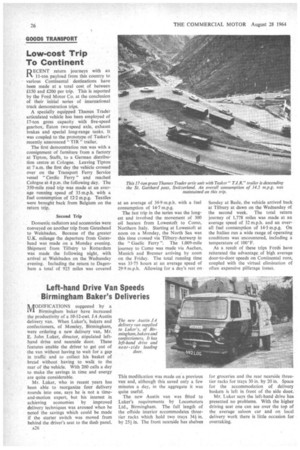Second Trip
Page 28

If you've noticed an error in this article please click here to report it so we can fix it.
Domestic radiators and accessories were conveyed on another trip from Gateshead to Weisbaden. Because of the greater U.K. mileage the departure from Gateshead was made on a Monday evening. Shipment from Tilbnry to Rotterdam was made the following night, with arrival at Weisbaden on the Wednesday evening. Including the return to Dagenham a total of 925 miles was covered at an average of 36-9 m.p.h. with a fuel consumption of 14.7 m.p.g.
The last trip in the series was the longest and involved the movement of 300 oil heaters from Lowestoft to Como, Northern Italy. Starting at Lowestoft at noon on a Monday, the North Sea was this time crossed via Tilbury-Antwerp in the "Gaelic Ferry ". The L009-mile journey to Como was made via Aachen, Munich and Brenner arriving by noon on the Friday. The total running time was 33.75 hours at an average speed of 29-9 m.p.h. Allowing for a day's rest on Sunday at Basle, the vehicle arrived back at Tilbury at dawn on the Wednesday of the second week. The total return journey of 1,778 mites was made at an average speed of 32 m.p.h. and an overall fuel consumption of 14.5 m.p.g. On the Italian run a wide range of operating conditions was encountered, including a temperature of 100°F.
As a result of these trips Fords have reiterated the advantage of high average door-to-door speeds on Continental runs, coupled with the virtual elimination of often expensive pilferage losses.




















































































































